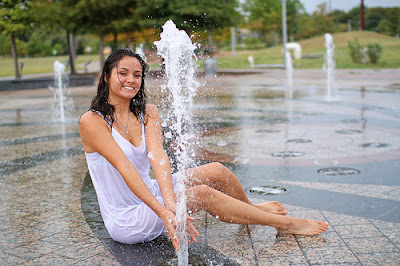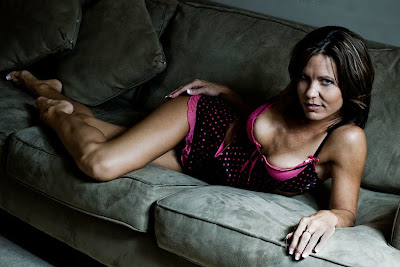No director of glamour photography models need be given a list of reasons why a head is invaluable in a picture. Some directors do, however, welcome ideas on how to bring the model's best face forward - whether it is one of beauty, character and/or expression.
Before we come to our views of the subject, however, we would like to acknowledge the presence of the controversy existing over the candid versus the controlled pose. Some directors contend they never direct their subject. 'To place a head or a mouth in a pre-determined position,' they say, 'would destroy all of the spontaneity and naturalness of the picture.'
Others, just as vehemently, contend that 'In a business that calls for consistent results, lucky mood and coincidence are not enough. They are not reliable and cannot be depended upon.'
We feel that when both director and model have a working knowledge of technique, each individual job will determine whether the pose requires controlled, candid or controlled-candid treatment.
Experienced directors practice many ways of getting a glamour photography model to act and react realistically before the camera. Each has developed ways of controlling a model without having literally to push her into position. Adroit use of words, exemplary action, strategic suggestion and psychological motivation all bring forth expression that is dependable as well as spontaneous. At the same time most directors have found in actual practice, that with intelligent direction from behind the camera, any capable model can accept correction and rearrange parts naturally without showing strain and losing spontaneity!
In photography we lean heavily upon the model's capabilities, yes, and in many instances even upon her ability to inspire us by doing something her way from which we can select or perfect a pose.
So, part of a director's success lies in his ability to keep a model suggesting ideas within the scope of the camera's ability to record them.
Many models feel they have exhausted the possibilities for different head positions when they have turned their head slowly from the left of the camera to the right of the camera! This can be most exasperating to a director (especially if you believe that you get the fullest creative contribution from a model by allowing her to move freely instead of placing her). Try a suggestion that will take her into several other positions from which you might select a pose.
You might ask her to repeat the horizontal turn - this time with her chin up a little higher. This gives you at least six additional positions to choose from. Then ask her to lower her chin and repeat the horizontal turn - six more positions! By repeating each of these eighteen positions with her head tilted right and then with her head tilted left, you've added another thirty-six possibilities without yet putting her in any exact position.
If your model has trouble with the tilt, which is the most difficult direction to understand, you might try this. Hold a pencil vertically in front of your model's face. Let the tip of her nose touch the pencil and divide it equally lengthwise. Ask her to put her chin on one side of the pencil and her forehead on the other as you repeat the word tilt.
With encouragement, let her try a few combined movements such as, 'Turn your head slightly to the right... that's good ... now tilt the top of your head right (or tilt your chin left).' If she loses her conception of tilt, hold the pencil before her again and she will usually remember it for the remainder of the sitting.



Tidak ada komentar:
Posting Komentar